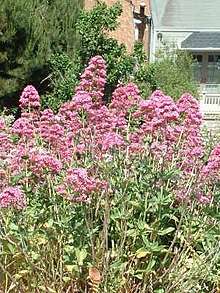Bodinnick
Bodinnick (Cornish: Bosdinek, meaning fortified dwelling) is a riverside village in south-east Cornwall, in the United Kingdom. According to the Post Office the population of the 2011 Census was included in the civil parish of Lanteglos-by-Fowey. It is a fishing village situated on the east bank of the River Fowey opposite the town of Fowey, also on the banks of the Fowey River. The ferry crossing is from Fowey to Bodinnick and the "Old Ferry Inn" is located on its bank glorified as "in the heart of Du Maurier country". This ferry terminal is said to have existed since the 13th century.[1][2][3][4]
Bodinnick
| |
|---|---|
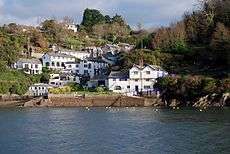 Bodinnick from Fowey | |
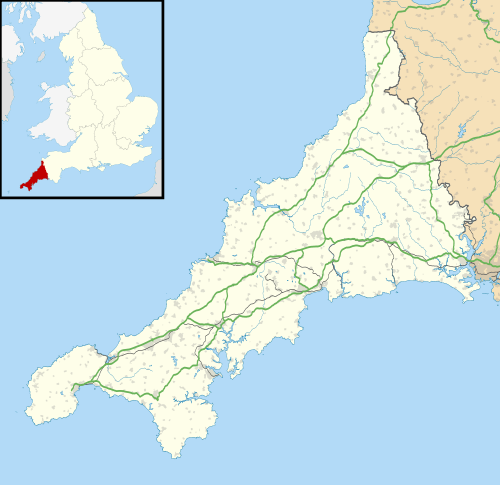 Bodinnick Location within Cornwall | |
| OS grid reference | SX130521 |
| Civil parish | |
| Unitary authority | |
| Ceremonial county | |
| Region | |
| Country | England |
| Sovereign state | United Kingdom |
| Post town | FOWEY |
| Postcode district | PL23 |
| Dialling code | 01726 |
| Police | Devon and Cornwall |
| Fire | Cornwall |
| Ambulance | South Western |
| UK Parliament | |
There are also places called Bodinnick in the civil parishes of St Stephen-in-Brannel and St Tudy.[5]
Geography
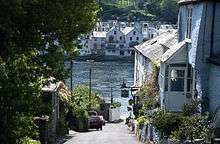
Bodinnick lies in the Lanteglos-by-Fowey parish on the banks of the Fowey River. Its importance is due the fact that it was a ferry terminal for people travelling from Fowey.[6] There is an "Old Ferry Inn" close to the bank of the river here. There is a camp site about 1 mile (1.6 km) from the ferry crossing.[7] A 4 miles (6.4 km) walk from the ferry crossing at Bodinnick goes through a scenic route called the "Hall Walk" along the Polruan River. A ferry services from here also connects to Fowey.[8] Hall Walk is along the cliff which is halfway up the Bodinnick hill which winds around the Pont Creek.[9] A creek, which is about 0.3 miles (0.48 km) in length joins an estuary at Pelene Point near about 0.25 miles (0.40 km) from Bodinnick. At the head of this creek there is chapel dedicated to St. Wyllow. Two miles in land to the north up another creek, on its north bank, off Bodinnick, there is the "Cell of Black Monks" from Montacute dedicated to Sa Syricus and Juliette.[4] Hermit St. Mancus's festival is held here. St. Wyllow was a contemporary of St. Mancus and Meubred and his tomb lies one mile away from Bodinnick, where a festival is also held in his honour.[6] There was also a chapel dedicated to St John the Baptist here.[10]
History
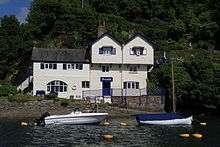
In August 1644, the king visited Cornwall and an attempt was made on his life with a cannonball, it missed, but was reported to have killed a fisherman nearby.[11] During the late 17th, 18th and 19th centuries, Bodinnick and the nearby villages of Fowey and Polruan were home to wealthy shipping merchants and master mariners.[12] The well known families who lived at the time were the Slades, the Salts and the Tadds. These families, for several generations, were involved in trading and transporting local China clay or imported coal with their schooners through the local ferry harbours.[12]
In the 1680s, John Gandy of Exeter supplied cloth to Philippa Randle of Bodinnick, sending consignments both by barge along the coast and across the fields by pack horse.[13] A shoe maker was also known to live in the village in the 1830s.[14]
Daphne du Maurier wrote many novels while living at "Ferryside" (a house that is stated to be still owned by her family) on the river bank at Bodinnick on the eastern shore, opposite to Fowey; she moved to Menabilly later after the publication of her 1938 novel Rebecca.[15][16][17] It was also the home of her sister Angela du Maurier for most of her life.
Vegetation
Hypericum maculatum is seen along the roadside near the ferry crossing. A rare plant known as the Allium ursinum grows during spring as a part of hedges. Centranthus ruber plants are also seen on the old walls.[18]
Facilities
A ferry service operates between Fowey and Bodinnick and gives its name to The Old Ferry Inn,[19] a 400-year-old building on the steep lane down to the riverside.[20] A 4 miles (6.4 km) walk along the hill tops connects Bodinnick to Polruan in the south.[21]
In Bodinnick Hall Place is a Methodist chapel now in use as a shippen. Features of interest are the north doorway and a western bell turret.[22]
References
- Luxford, George; Newman, Edward (1845). The Phytologist: a popular botanical miscellany. John van Voorst. p. 942.
- Ordnance Survey: Landranger map sheet 200 Newquay & Bodmin ISBN 978-0-319-22938-5
- "The Old Ferry Inn". Oldferryinn.com. Retrieved 31 December 2010.
- John Leland; John Chandler (February 1993). John Leland's itinerary: travels in Tudor England. A. Sutton. ISBN 978-0-86299-957-5.
- Weatherhill, Craig (2009). A Concise Dictionary of Cornish Place-Names. Westport, Co. Mayo: Evertype. ISBN 9781904808220; p. 22
- Alan Thacker; Richard Sharpe (2002). Local saints and local churches in the early medieval West. Oxford University Press. p. 356. ISBN 978-0-19-820394-0.
- Robert Andrews (April 2004). Rough guide to England. Rough Guides. p. 491. ISBN 978-1-84353-249-1.
- Oliver Berry; Belinda Dixon (2008). Devon, Cornwall & Southwest England. Lonely Planet. p. 269. ISBN 978-1-74104-873-5.
- Margaret Forster (1993). Daphne du Maurier. Chatto & Windus.
- Samuel Lysons (1814). Magna Britannia: being a concise topographical account of the several counties of Great Britain. Containing Cornwall. Cadell. p. 185.
- Allen, John (1856). History of the Borough of Liskeard and its vicinity. Cash. p. 84.
- Lindy Woodhead (2003). War paint: Madame Helena Rubinstein and Miss Elizabeth Arden : their lives, their times, their rivalry. John Wiley and Sons. p. 59. ISBN 978-0-471-48778-4.
- Overton, Mark; Dean, Darron; Whittle, Jane (2004). Production and Consumption in English Households 1600–1750. Taylor and Francis. p. 117. ISBN 978-0-203-64477-5.
- Payton, Philip (2005). The Cornish overseas: a history of Cornwall's 'great emigration'. Dundurn Press Ltd. p. 85. ISBN 978-1-904880-04-2.
- Robert Andrews (2004). The Rough Guide to Devon & Cornwall. Rough Guides. p. 15. ISBN 978-1-84353-312-2.
- Else, David (2003). Britain. Lonely Planet. p. 414. ISBN 978-1-74059-338-0.
- Forster, Margaret (1993). Daphne du Maurier. Chatto & Windus. p. 50.
- George Luxford; Edward Newman (1845). The Phytologist: a popular botanical miscellany. John van Voorst. p. 942.
- "The Old Ferry Inn". Old Ferry Inn website.
- Quiller-Couch, Sir Arthur (2008). Memories and Opinions: An Unfinished Autobiography. Cambridge University Press. p. 91. ISBN 978-0-521-73674-9.
- Berry, Oliver; Dixon, Belinda (2008). Devon, Cornwall & Southwest England. Lonely Planet. p. 269. ISBN 978-1-74104-873-5.
- Pevsner, N. (1970) Cornwall; 2nd ed., revised by E. Radcliffe. Penguin; p. 40
